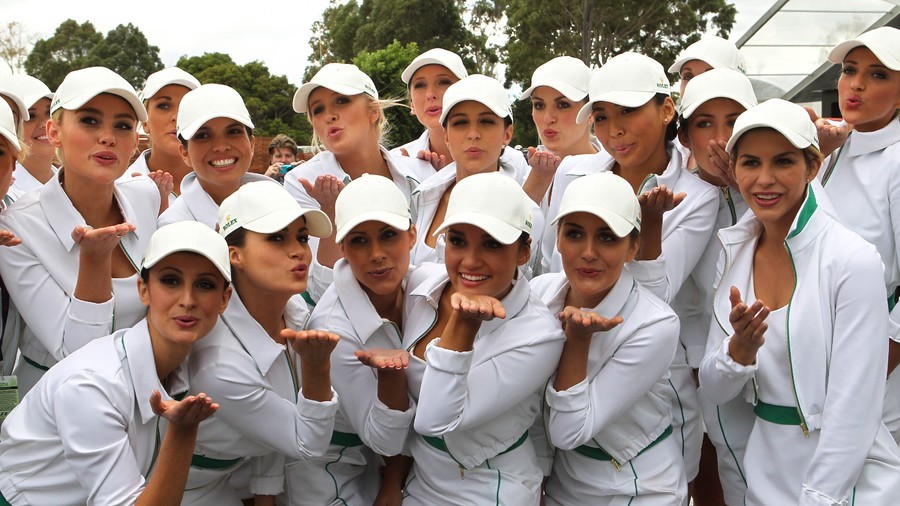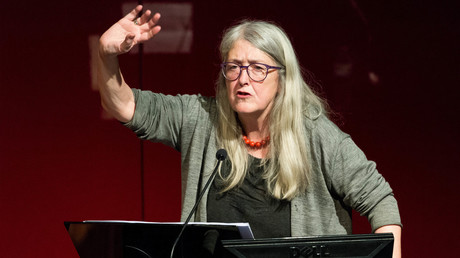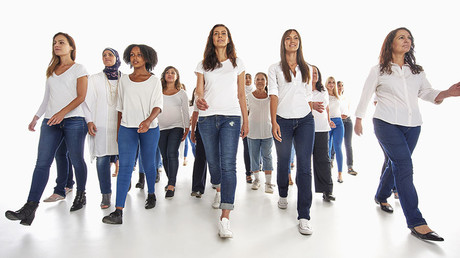Danielle Ryan is an Irish freelance journalist. Having lived and worked in the US, Germany and Russia, she is currently based in Budapest, Hungary. Her work has been featured by Salon, The Nation, Rethinking Russia, Russia Direct, teleSUR, The BRICS Post and others. Follow her on Twitter @DanielleRyanJ, check out her Facebook page, or visit her website: danielle-ryan.com

Grid girls, walk-on girls, booth babes: Say goodbye to the lot of them. Thanks to pressure from the now-wildly-overdone #MeToo movement, scantily clad females are being banished from international sporting events.
In February, both Formula 1 and the Professional Darts Corporation (PDC) decided to end the practices of hiring ‘grid girls’ and ‘walk-on girls’ for their events. Now, ‘booth babes’ are being banished from the Geneva Motor Show opening on March 8.
The hashtag movement that started as reaction to Hollywood abuses is having a knock-on effect throughout the US and many other parts of the world. To that I say, great… if it means ridding workplaces of rampant sexual harassers and abusers. On the other hand, banning women from doing certain jobs because another group of women has decided that they are being exploited — do we really need to go down that road?
There are women who enjoy dressing up (or down, however you want to look at it) and having their bodies on display. It’s fun and enjoyable to them — and most importantly, it’s their own personal choice. Are they being exploited, objectified or degraded? You could argue that they are — but is it up to the rest of us to decide?
In ending the practice of hiring ‘grid girls’ Formula 1 wrote in a statement that it is “at odds with modern day societal norms” and is not “appropriate or relevant” to F1 fans.
In a way, this makes sense to me. Personally, I have never understood how women walking around in bikinis, or sprawling themselves across car bonnets had anything to do with cars — but that’s a matter of perspective. I’m not going to tell anyone they can’t do it or enjoy doing it. If the women enjoy it — and the fans enjoy it (which they clearly have done for a long time) — then is this really a problem we need to fix?
Ironically, a week after F1 announced grid girls would become a thing of the past, Formula One’s chief executive, Chase Carey, confirmed there would still be “pretty girls at races.” This was because racing is a sport of “glamour and of mystique”.
What really makes the furor over these jobs hypocritical is that often the same people who argue that ‘grid girls’ and ‘booth babes’ are detrimental to society will also insist that women are free to dress how they please — and that what a woman is wearing should have absolutely no bearing on how she should be treated. If that’s the case (which it is) then what’s wrong with allowing women to enjoy jobs that require skimpy clothing? We can, I assume, all agree that the women who do these jobs should not be harassed or abused while doing them — so where’s the problem? Are they now arguing that the clothes these women are wearing at car shows are encouraging harassment and disrespect?
If bikinis and skimpy clothing aren’t allowed on the Formula 1 tracks or at car shows, let’s just ban them altogether. It’ll be great for theburkini industry. Although, speaking of burkinis, Geneva has banned those too, so it seems people will have a problem with it whether women strip down or cover up.
Feminists — and I would count myself as a feminist insofar as I believe in completely equal rights and opportunities for men and women — have become overly eager to defend women who don’t feel the need to be defended. This kind of overzealous approach completely distorts what feminism is supposed to be about, which is choice. Some women claim they feel empowered and fulfilled by working in the porn industry. It’s not up to me or anyone else to tell them that they’re wrong — or to ban them from doing it — if that’s what they want. Ironically, many feminists agree that porn is “empowering” to women.
“The current public moral space has no coherence or consistency,” wrote one columnist for The Spectator. While F1 girls are outdated and exploitative, he wrote, porn is apparently fine according to the same people.
Likewise, “it’s okay for singers whose target audience is pre-teen girls to be crudely sexual and dress half-naked as long as they’re woke; ditto films and television being sexually graphic, as long as everyone makes the right vacuous points on Oscar night. Sex work likewise is a morally neutral issue because it’s empowering; except when it’s not. Women enjoying lifestyle choice is good; except when it isn’t,” he wrote.
We’ve entered a weird, upside-down phase of feminism where we’re telling women they can’t do something that they want to do because someone else feels it is violating their rights. If we continue down this road, there are a whole lot of other things we could start banning, too.
Maybe, for example, we should ban makeup. After all, the cosmetics companies are essentially telling us we don’t look good enough as our natural selves. So yes, let’s ban them and force women to stop using makeup because we should all be happy and confident in our natural states.
Maybe we should also ban plastic surgery, too. What could send a worse message to women and girls than an industry that says come on in and we’ll surgically re-alter your entire appearance to make you look better? Yep, let’s go ahead and ban that too.
While we’re at it, let’s ban women from being housewives and force them to also have careers outside the home. It is their right to be ‘fulfilled’ according to today’s definition of self-fulfillment.
But let’s be realistic here. If automakers and sports bodies want to do away with the practice of grid girls, it’s not the end of the world either. It’s not an industry which employs millions of women full-time. Swathes of women are not going to find themselves totally prospectless because car manufacturers won’t employ them to draw attention to their newest models anymore.
It’s just unfortunate that the #MeToo movement has become so distorted that it’s now about telling women what they can and can’t do. And at that narrowly defined by politically-correct Oscar night speeches.
The statements, views and opinions expressed in this column are solely those of the author and do not necessarily represent those of RT.




0 Comments:
Post a Comment
Subscribe to Post Comments [Atom]
<< Home